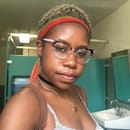I’ve noticed an absence. An absence of dialogue, an absence of images, and an absence of ideas greater than what was already there when it came to black queer representation. When we think of black queer women, sex and fetishization run in the foreground with little room for development or exploration into more nuanced parts of human interaction and sexuality. We only see black lesbians as sex objects for the consumption of men and not their own sense of pleasure and fulfillment. Sex is a part of our daily lives as a societal whole, as well as the lives of many black queer women, but it is not the only aspect of same sex relationships. The issue at large is not just the concept of sex, but the lack of anything else in any substantial form.
These images we see are overly saturated with violence and sex, while missing out on key emotions and experiences that everyone–gay or straight–undergo during their lifetime. There are key motifs that black women are not privy to when it comes to representation in the media and film: vulnerability, elation, and depression. We expect black women to take care of the world and heal the sick with our bare hands while we have nothing left over for ourselves. This is then furthered by the erasure of black queer women whose sexuality is often seen as invalid unless it’s for the purpose of pleasuring the needs of a man. Films like “To All the Boys I’ve Loved Before” and “Perks of Being a Wallflower” are all coming of age films, but films like these are never seen with black faces or narratives. There is an entire market of media and film that is currently not being pursued by Hollywood and that is detrimental to not only society, but to the people who don’t see themselves reflected in the images at large. This absence creates barriers and draws distinctions of who is important in America and who gets the right to be seen and furthermore, who gets the right to have their voices heard.
This further pushes my perspective of not pandering to white people or anyone else to create content I want to see. I can’t expect white people or any other group to understand the images that frequently float about in my head or how endless they are. I’m especially sick of played out queer films with only white women or men playing the lead when black queer narratives exist. Black creatives deserve to have their ideas and thoughts shared with the world that we live in and that is what I hope to see in the future. I don’t need to see the same, redundant portrayals of white people white peopling when there are so many facets of the black community that have never been captured on film.


